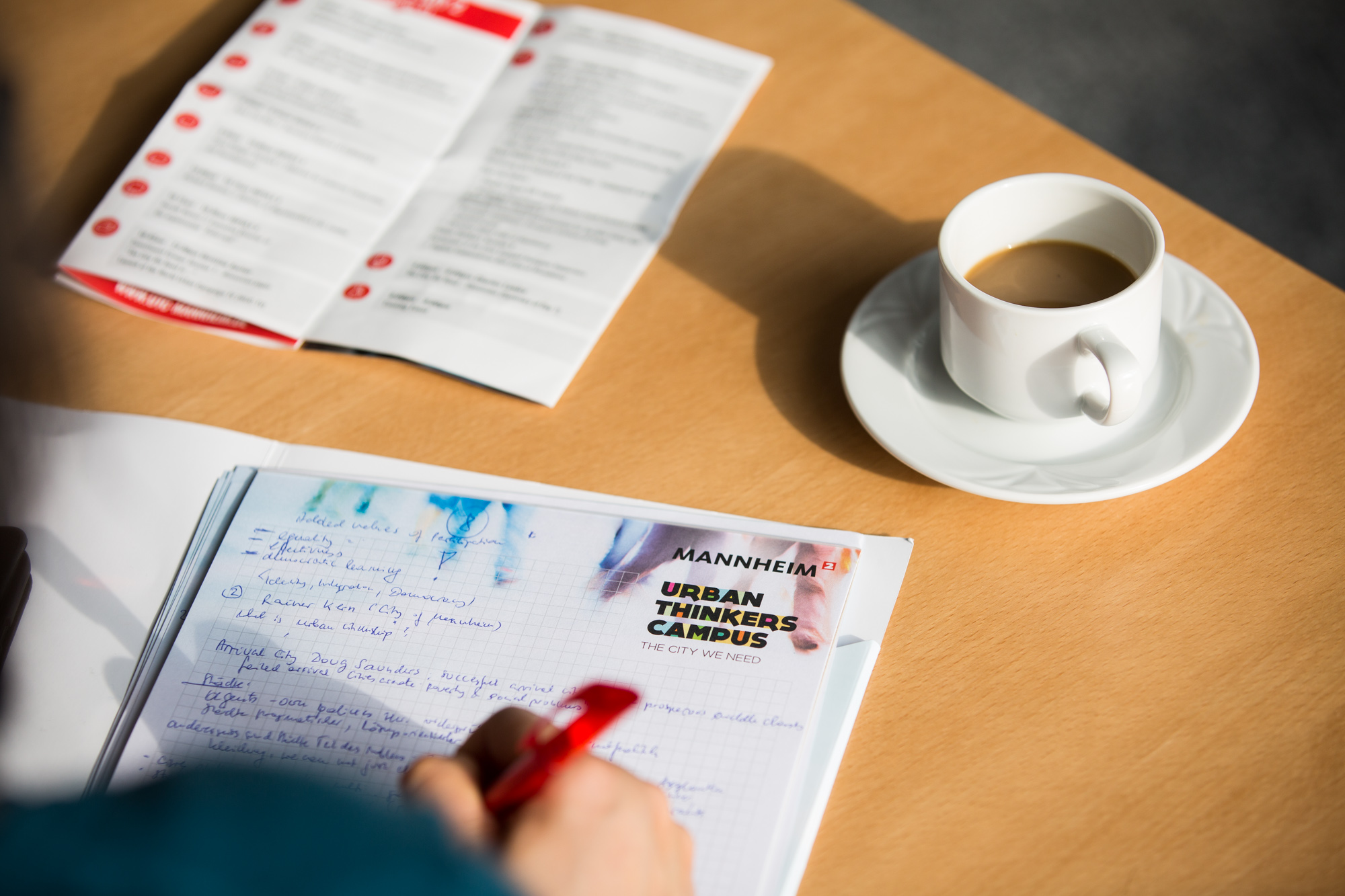The second day of the Urban Thinkers Campus in Mannheim’s Stadthaus N1 began with a welcoming speech by Charles Landry – followed by keynote speeches by Christine Auclair (Project Manager World Urban Campaign at UN-Habitat), Ana Lisa Boni (Secretary EUROCITIES), Astrid Meyer (Ministry of Economic cooperation and development), Richard Stanton (Director migration Work CIC, London) and Harald Welzer (director of “Futurzwei – Foundation”).
In four Urban Thinkers Sessions a wide range of topics has been discussed. In Session 1 with Prof. Dr. Andrea Römmele (Hertie School of Governance), Dirk Gebhardt (Marie Curie researcher at GRITIM University Pompeu Fabra in Barcelona) and Rainer Kern (Mannheim of Mannheim) dealt with the topics of identity, integration and democracy. “The city of the future should have the right to grant the status of citizenship,” was one of the demands of the session’s participants. “The city evolves into a laboratory, in which future concepts will be tested. It is a complex system and its great potential is the diversity. The city of the future is participatory. ”
The UTC Session 2 with Tom Higham (CEO at Future Everything) and Oliver Rack (Open Data Rhein-Neckar) dealt with aspects of digital life and the new urban citizenship. In the subsequent virtual discussion the following statement was drawn up: “In a world with dwindling natural resources, the resources must be distributed equaly, such as the access to Open Data. Culture gains an important role in this transition. Overall, the digital transformation of all parts of society must become more conscious.”
In the session with Dr. Andreas Blüthner (Mannheim University) and Wolfgang Riegelsberger (Youth Ambassadors of UN-Habitat initiative) the UTC-participants discuss the multisectoral cooperation in the fields of youth and labor: “UN Habitat is one of the biggest challenges, seeking to find solutions to solve extremely high unemployment amongs the youth. This should be achieved by using already proven tools that need to be adapted to the national circumstances. Partnerships with the private sector and cooperation are of essential importance. ”
The reinvention of governance and the evaluation of the new urban age was the subject of another session – led by Alexander Heichlinger (European Institute of Public Administration) and Christian Hübel (City of Mannheim). Great attention was devoted to discussion of the potential of digital social media. Christian Hübel: “Three points were voted as key factors: first, participation and empowerment of citizenship – among others with town hall meetings. Second: an appropriate long-term strategy for orientation and third: a transparent and involving communication. The new digital generation must not be lost – therefore digital media and social media are to be used intensively for communication”.

Recent Posts
- Experts internationaux et nationaux,(Conakry, Guinée et à domicile), DATE DE CLOTURE: 30 juin 2019
- Call for Expressions of Interest to Host the Global Water Operators’ Partnerships Alliance Secretariat
- EoI – URBAN PATHWAYS – Supporting Low Carbon Plans for Urban Basic Services in the context of the New Urban Agenda
- Sierra Leone hosts stakeholders meeting on New Urban Agenda and WUF 10
- Declaration of the First Global Stakeholder Forum of the First UN Habitat Assembly
Archives
- June 2019
- May 2019
- April 2019
- March 2019
- February 2019
- January 2019
- December 2018
- November 2018
- October 2018
- September 2018
- August 2018
- July 2018
- June 2018
- May 2018
- April 2018
- March 2018
- February 2018
- January 2018
- December 2017
- November 2017
- October 2017
- September 2017
- August 2017
- July 2017
- June 2017
- May 2017
- April 2017
- March 2017
- February 2017
- January 2017
- December 2016
- November 2016
- October 2016
- September 2016
- August 2016
- July 2016
- June 2016
- May 2016
- April 2016
- March 2016
- February 2016
- January 2016
- December 2015
- September 2015
- April 2014
- December 2012
- March 2012

